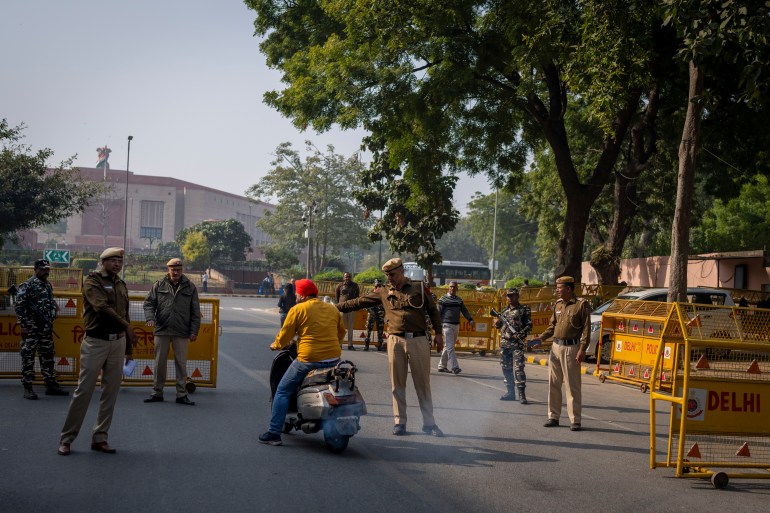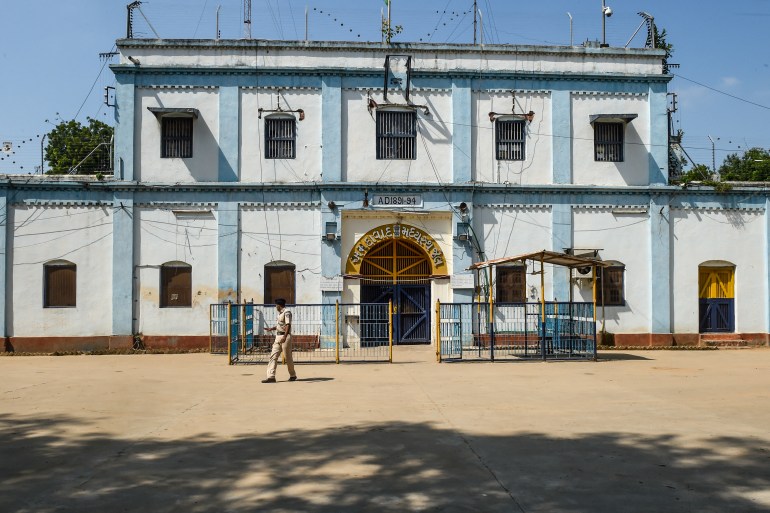New Delhi, India – Late last month India’s parliament passed two sets of controversial legislation in the biggest overhaul of the criminal justice system and telecom laws that critics say could greatly increase police powers and facilitate mass surveillance.
Thank you for reading this post, don't forget to subscribe!The first set of legislations comprises three criminal laws – Bharatiya Nyaya Sanhita (BNS), Bharatiya Nagarik Suraksha Sanhita (BNSS), and Bharatiya Sakshya Adhiniyam (BSA) of 2023 – that will replace the colonial-era India Penal Code, the Code of Criminal Procedure and the Indian Evidence Act.
India’s Home Minister Amit Shah asserted that the new bills will free the citizens from “the colonial-era mindset and its symbols”.
However, critics claim that the Bharatiya Janata Party (BJP) government has used the discourse of decolonisation to enact laws that are more draconian than the laws they are replacing. The changes, they say, fit into the ruling party’s larger project of Hindu nationalism, with its projection of the past as a time of humiliation for Hindus, and its narrative that it is “shedding colonial baggage”.
The second piece of legislation, the Telecommunications Act of 2023, seeks to modernise India’s century-old telecom law. But some experts warn the new bill will enable indiscriminate surveillance and erode privacy.
The new set of crucial laws was passed without substantive debate in the parliament. Critics have accused the government of Prime Minister Narendra Modi of pushing through laws in parliament without allowing it to adequately scrutinise them.
The new criminal laws will be rolled out in phases by December 2024. The government has not yet notified the implementation of the Telecoms Act.
Al Jazeera reached out to India’s home ministry and telecoms ministry for their response but did not hear from them until the time of publication.
Here’s what we know about the new laws so far:
What do the laws change — and do they threaten civil liberties?
Police Custody: The period for which the police can seek direct custody of an accused — before she or he is sent to a jail — has been increased from 15 days to up to 60 days.
“Courts have traditionally been extremely reluctant in granting bail when there is a possibility of police custody. Now that the window has increased, it may become even more difficult to get bail,” Bharat Chugh, a former judge at Delhi’s criminal courts and Supreme Court lawyer said.
With at least 75 percent of prisoners in India’s overcrowded jails being under-trials (those whose trials are yet to begin), the Supreme Court of India has repeatedly emphasised “bail, not jail” as a rule.
With courts hesitant to grant bail during the possibility of police custody, the change in law could have “grave implications for life and personal liberty”, said Chugh.
Human rights activists have highlighted how most cases of torture usually happen in police custody. A 2020 report by the National Campaign Against Torture, a platform of NGOs, found that an average of five people die in custody each day in India, with some of them succumbing to torture in police or judicial custody. Convictions remain scarce.

Sedition: In 2022, India’s Supreme Court had temporarily suspended the 154-year-old law on sedition, a colonial-era provision that criminalises speech or actions against the government or authority with the possibility of a death sentence.
Although the new criminal law makes no mention of the word “sedition” anywhere, experts have argued that it brings back a more draconian version through a back door.
The new criminal code criminalises an even more vague action – acts that “endanger sovereignty or unity and integrity of India” – to punish offenders with seven years to life in jail.
Experts say such an ambiguous definition of an offence is likely to be misused. Sedition laws are already commonly used against journalists, activists and political dissidents.
“These expressions are indeed wide and not very precise,” Chugh, the former judge, said. “This gives too much power to the investigators. A criminal law, given that it impacts personal liberty, has to be specific, precise and unambiguous.”
While the law clarifies that criticism of government actions is not an offence as long as it calls for change via lawful and democratic means, critics, including Chugh, argue that it “falls short”.
Special offences in ordinary law: The new criminal statutes also incorporate special offences, such as “terrorism” and organised crime, governed by special laws, into ordinary criminal statutes without the accompanying safeguards.
For instance, India’s special “anti-terror” Unlawful Activities (Prevention) Act of 1967 (UAPA) requires prior sanction by the government and examination of all evidence by an independent authority to prosecute someone on “terrorism” charges.
The new criminal statutes do not incorporate any such safeguard while bringing “terrorism” as an offence within them.
Even with the — however few — safeguards, the UAPA, which prescribes stringent conditions to grant bail, has according to critics been misused by the government to imprison its critics for long periods.
Experts fear that police may now choose to invoke ordinary criminal law over special laws to circumvent safeguards, leading to misuse.
“This gives the police officers unchecked discretion to pick one law over the other, or in many cases, invoke both laws. This will lead to a multiplicity of litigation and sometimes, different courts arriving at different conclusions on the same set of facts/evidence,” Chugh said.
Is it the end of colonial-era laws, as the government claims?
Despite being dubbed “reforms,” experts Al Jazeera spoke to contend that the new laws mostly preserve provisions from their colonial-era counterparts, presenting an “old wine in a new bottle”.
Chugh said the evidence law, which governs the admissibility of evidence in courts, sees almost no modifications.
The penal code, which defines crimes and provides their punishments, incorporates only a few additional offences and the rearrangement of sections, he says.
Some of the changes to the criminal procedure code, such as the increase in duration for which people can be kept in police custody, are “quite troubling,” Chugh said.
Chugh said instead of the new bills, the government could have made the changes by introducing new sections or sub-sections within the existing laws.
The Telecommunications Act provides for a simpler licensing regime for telecom networks, a framework for the interception of messages and internet suspension – without safeguards, and introduces the biometric authentication of users, raising concerns about privacy.
Apar Gupta, advocate and former executive director of the Internet Freedom Foundation, said the new law “cements authoritarian control over the rights of ordinary citizens”.
“State control is present throughout the Telecom Act without any change to the colonial architecture. Changes within it are a clever rewording of phrases. It extends the colonial powers of interception of your communications without any safeguards,” Gupta told Al Jazeera.

The definition of “terrorism” has also been widened. How dangerous is it?
Not only has a special offence like “terrorism” been included in the ordinary penal code, but its definition, too, has been widened.
India’s special law for “anti-terror”, the UAPA, requires an act to be a “violent act” to be considered a terrorist act. The new penal code, however, could potentially implicate peaceful, non-violent acts with a definition of terrorism if they meet other criteria, such as any action that could threaten “unity, integrity … of India … by using any other means of whatever nature”.
“The expression used is indeed pretty wide,” said Chugh.
“In fact, other terms in the section such as ‘damage to the monetary stability of India by way of production … circulation of … any other material’ also is extremely vague. As I said earlier, a criminal law, by its very nature, should be precise.”
The new definition also includes any act that threatens the “economic security of India” as terrorism. Many fear the provision’s potential misuse in charging individuals who question the government or industrialists close to the government.
Will it put a strain on the already overburdened criminal justice system?
Experts express concerns that the new criminal laws, along with their additional provisions, may lead to setbacks and delays in legal proceedings. There are more than 50 million pending cases burdening India’s justice system.
Chugh, the former judge, argues that the new laws have provisions that could potentially introduce “inadmissible and inferior quality of evidence” in a case before a court that will result in a prolonged trial.
He also anticipates challenges in aligning the changes with existing laws and systems. For instance, in ongoing trials, will the previous statutes or the new ones apply? What about evolving situations, such as pending investigations, inquiries and trials?
“For instance, if an investigation is carried out under the earlier criminal procedure code, but further investigation is sought to be done under the new one, which law would apply?” Chugh asked.
These are significant questions that the federal government has left unanswered.
“Addressing these concerns would require subsequent amendments in other laws, updates to proformas, and training for judges, lawyers, police officers, and other stakeholders – efforts that demand significant time and resources,” he said.
Does the new Telecommunication Act extend surveillance to online communications services? Will it affect privacy?
The new law will replace three archaic laws – the Telegraph Act of 1885, the Indian Wireless Telegraphy Act of 1933 and The Telegraph Wires (Unlawful Possession) Act of 1950.
Communications services like Signal, Zoom, Skype and Gmail were not covered under previous laws. This allowed them to maintain their end-to-end encryption and protect the privacy of their users.
However, the new law increases government control over the internet, raising privacy concerns.
Experts said that the new law controls “telecommunication services”, a term that they describe as vague and defined by the new law as “any service for telecommunication”.
This could potentially include over the top (OTT) messaging applications such as WhatsApp, Facebook Messenger and Google – but the government has been tight-lipped about this ambiguity.
If the government does decide to include OTT platforms as part of “telecommunication services”, it will give it the power to license these platforms.
It would then be able to set “standards” for telecom services regarding encryption and data processing, which experts find problematic.
Radhika Roy, a lawyer at the Internet Freedom Foundation, said that by setting these standards for different OTT platforms, the new law can now “potentially authorise the government to obtain identification of first originator of information through backdoor mechanisms or even the creation of lists that could pick up certain words – think mass surveillance”.
“Such identification can hamper free speech over messaging apps – the common man may have to self-censor themselves before even sending a personal message,” Roy warned.
The new law could also break encryption and facilitate traceability as it mandates user identification through “verifiable biometric-based identification”. It also penalises citizens who provide false identification details.
Experts said this could have massive implications for journalists and whistleblowers who need to function with some level of secrecy and anonymity.
Regarding internet suspension practices, Gupta, the digital rights advocate, criticises the law for reiterating the power to impose internet blackouts without statutory safeguards, despite court cases and recommendations by the Parliamentary Standing Committee for Information Technology.
India has already been ranked the worst country for internet freedom, with the disputed Kashmir region witnessing 49 out of 84 internet shutdowns across the country last year.
“These safeguards could have been in the form of mere transparency, such as the duty of the state governments to send copies of its internet suspension orders to the federal government and then for the federal government to maintain a central directory of orders,” Gupta said.

